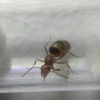I don’t see any problem with releasing native ant colonies. Non-native species should be humanely euthanized if one can no longer keep them.
Digging up established colonies from the wild is something I’ve preached against for years on this forum. If you consider how few queens successfully found a colony, each established colony should be celebrated and protected. This is true even for small colonies, which are needed to grow up and replace old ones (consider fishing size limits). When you remove wild colonies, you are removing the genetic all-stars from the breeding pool. A final reason not to do this is that uprooted colonies almost always languish and fail in captivity. Take a stroll through the journals on here if you don’t believe me.
The exception to the above is if you are a legitimate researcher doing real research.The genetics argument could also be used against releasing any ants as well. So, I'm going to disregard all of you guys' feelings for your colonies for a second and be blunt: chances are, your colonies suck - genetically, that is. The only reason why they're still alive is because they're pampered and sheltered in their captive lifestyle, and could never have established themselves in the wild. Of course a couple percentiles of captive colonies have good genetics, but like I said, most do not. I've also observed that captivity tends to make colonies soft; they don't lose workers except to old age very often, their food is pre-killed and consistent, they don't have to deal with weather or conditions, and their enclosures are sterile in comparison to the wild. Nurture definitely plays at least a limited role in colony behavior and wellbeing. So the combination of the fact that your colony most likely has crappy genetics and they've been pampered to the point of near dependency on their keeper makes it pretty clear that releasing a larger colony would highly increase the risk of that colony's death, or if not put them through a system shock. So based on these reasons I believe it is inhumane to release captive colonies themselves and put them in severe danger, and is a bigger reason than any potential environmental risk factors.
I believe to move beyond speculation is to actually in a controlled and monitored procedure release captive endemics and then get the data to see what actually happens to them. As for invasives or non-endemics NEVER release but destroy.
With the apparently increasing interest in formiculture/ant keeping it would be a worth while scientific research point to actually do a study on repatriation of captive colonies in their endemic ranges and see if there are actually any differences occurring once they are repatriated. I suspect that there would not be any since unlike human dependent species like the silk moth which is no longer found 'in the wild' but only in human care no ants are 'domesticated', even the honey bee which has been kept by humans for millenia when allowed to swarm and 'go native' easily adjusts to non-apiary conditions. I suspect the only ants that would have a hard time might be fungus growers since just placing a colony with fungus under a rock may just cause the fungus to crash.
I think this study would be helpful, because i have C. floridanus colonies I am tempted to release(Small ones) when they get about 50-100 workers.














